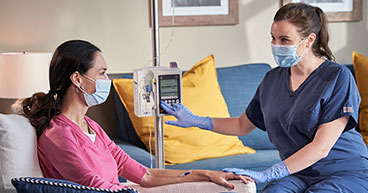
Routines tend to change as the leaves turn color and cooler weather arrives. While seasonal shifts may be a welcome change, colder temperatures may present some unique challenges for those with cancer.
Cancer patients are more prone than the average person to feeling cold and to catching viruses, so they have special considerations when the mercury drops.
In this article we will explore:
- Why do cancer patients feel cold?
- Does chemotherapy make you cold?
- Does cold weather affect neuropathy?
- Are cancer patients more prone to infection?
- Reducing your risk for viruses
- Tips for navigating winter if you have cancer
If you’ve been diagnosed with cancer and want to get a second opinion on your diagnosis or treatment options, call us or chat online with a member of our team.
Why do cancer patients feel cold?
Even sitting by a cozy fire indoors, cancer patients still may feel chilled.
Suji Mathew, MD, MS, FIDSA, infectious disease physician and Chief of Medicine at City of Hope® Cancer Center Atlanta attributes this to two main factors:
Anemia
“Anemia and overall immunity may lead to cold intolerance.” Anemia is a condition in which the blood has lower than normal red blood cells and a reduced ability to transport oxygen. Cancer and cancer treatments may reduce blood supply volume and blood cell counts and lead to lowered immunity and anemia, Dr. Mathews says. To help counteract anemia, people should try to eat a balanced diet or take supplements to help ensure adequate nutrition. Dehydration also may cause chills due to disruption of how the body regulates its temperature, so be sure to drink plenty of fluids.
Advanced cancer
Advanced cancers, those that have spread beyond the primary location, may take such a toll on the body that it is unable to properly regulate body temperature.
Does chemotherapy make you cold?
Depending on the type of treatment you are receiving, chemotherapy, and certain drugs in particular, can exacerbate feelings of cold in cancer patients.
For instance, a side effect of the common chemotherapy drug Oxaliplatin may be a hypersensitivity to cold and cold-induced neuropathy.
Neuropathy is when nerves, often in the extremities like the hands and feet, do not function properly, causing a numbness or tingling feeling. Cold-induced neuropathy makes the tingling and numb feelings even more pronounced, or even painful, when in contact with cold temperatures.
Again, the impact chemotherapy may have on the oxygen-carrying red blood cells and the infection-fighting white blood cells, may lead to feeling cold and even numb when sufficient red blood cells are not getting to your fingertips and toes.
Does cold weather affect neuropathy?
Cold weather may exacerbate neuropathy since lower temperatures cause blood vessels in the extremities to further contract, which naturally happens to ensure blood flow to vital organs to maintain core body temperature.
Cancer patients with neuropathy may not only be super sensitive to cold, but they may be in danger if they don’t protect themselves from prolonged, freezing temperatures.
“If I’m out and about and the biting cold is what reminds me to bundle up because the tips of my fingers or the tip of my nose is cold, I may not do so as a cancer patient with neuropathy,” says Dr. Mathew. “Neuropathy may make you less aware of changes in temperature and pain, which is the job of the nerves to remind you, ‘ok, there is pain, therefore you need to bundle up.’
“Same if someone tries to warm themselves with warm water. If no one has checked the temperature, they could burn themselves. Neuropathy affects your perception of pain and temperature changes.”
Experts advise wearing multiple layers of clothing if you spend an extended period outdoors since you may not be able to accurately judge just how dangerously cold your extremities are getting. Frostbite and hyperthermia may result if you don’t take adequate precautions.
Drink warm beverages, keep moving, use a heated blanket if sedentary and limit time outside in freezing temperatures, if possible.
Are cancer patients more prone to infection?
Cancer and treatments for it may take a toll on your immune system as it battles the disease. With a lowered immunity, your body may not be able to ward off commonly circulating viruses.
“It could be the chemo you’re on or immunotherapy —anything that knocks down the immune system to help fight the cancer basically makes you more susceptible to infections,” says Dr. Mathew.
To compound that vulnerability, in the winter, “we tend to stay indoors and huddle around more. We’re in enclosed spaces more. We like the warmth—to get away from the cold outside,” Dr. Mathew says. “This just predisposes you to be around more people. So, you’re more susceptible to infections because you’re around someone who may have the sniffles and it’s easy to spread it.”
Reducing your risk for viruses
With the COVID-19 pandemic still fresh in our memory, virus avoidance protocols are probably pretty familiar, but it’s good to keep them in mind. They include those listed below.
Practice hand hygiene: “Use hand sanitizer or wash your hands before touching your eyes, nose or mouth,” says Dr. Mathew. “And especially wash before you eat or after you use the bathroom. Every time you shake hands with somebody there could be germ transfer. Just be mindful that these are the ways, if your immunity is not strong, you could be more susceptible.”
Keep your distance: The pandemic’s six feet of separation is a good rule of thumb, but also try to follow your regular routine just more mindfully, Dr. Mathew says. “If you have to do grocery shopping, do it extremely early or late in the day. Just try to avoid times when you think crowds would be the greatest,” she suggests. And don’t skip going to the gym just to avoid people. “Either walk outside or go to the gym—I’m a big exercise proponent—just make sure you wipe down the equipment before you start. And visit the gym when it’s less crowded.”
Wear a mask: Dr. Mathew advocates wearing a mask. “There is always someone who has the sniffles, so you can protect yourself somewhat if there is someone sneezing and coughing in your area,” she says. “You at least have a layer of protection with the mask. When you’re at home with people you know, you don’t need to wear a mask. But if somebody is sick at home, both they and you should wear a mask to protect yourself.”
Maintain good nutrition: An unhealthy diet can weaken your body’s immunity, Dr. Mathew says, recommending nutrient-dense foods containing protein, healthy fat and moderate carbs, and limiting ultra-processed foods. If you have lost your appetite, consider a multi-vitamin or drinking a protein shake several times daily. Your doctor and dietitian may help ensure you’re getting adequate nutrients. “All of that lays the fabric to help you not just in the winter, but also when you get treatment, so you have a healthy foundation,” Dr. Mathew says.
Bundle up: “If you step out in the cold and you are not adequately protected, like you don’t have earmuffs and it’s really cold or you don’t have a good jacket on. Think of it as the cold has attacked your body and your body has to work harder to keep you warm and could make you more susceptible to infections,” Dr. Mathews explains. She adds: “Stepping in and out of a warm building and into the cold—those rapid changes in temperature—means the body has got to work a little harder to maintain your stasis and could mean you get exhausted more easily.”
Get vaccinated: A seasonal flu vaccine, a COVID vaccine and possibly an RSV vaccine will help you avoid illness. Consult with your doctor on timing of the vaccines, since you may want to take them between cancer treatment cycles. “You’re already going to feel a little terrible from the chemo, so maybe wait, at least a week out and then get the vaccine, if you’re in the midst of your treatment cycles,” Dr. Mathew says. “Or if you’re about to start chemotherapy, take the vaccines a couple weeks before you start.”
Know your body and how it has reacted to vaccines in the past and plan accordingly, says Dr. Mathew. Some people may feel fatigued or have mild flu-like symptoms—although the Flu vaccine cannot give you the flu. Combining vaccines, like taking the flu and COVID vaccine at the same time, is convenient, but if you know you will feel bad, spread them out as it may be easier to specifically point out the side effects of a particular vaccine when it’s taken separately as opposed to together.
Others in your household should also be vaccinated for everyone’s protection, Dr. Mathew says.
Tips for navigating winter if you have cancer
Knowing how cancer and cancer treatments may have an impact on your body is crucial to navigating the unique challenges cancer patients may experience in the winter, Dr. Mathew says.
Here are several more tips for staying comfortable this winter:
- Set your thermostat to a temperature comfortable for you
- Maintain a regular exercise routine
- Eat a healthy diet to keep your body strong and resilient
- Get adequate sleep
- Try to minimize emotional stress by making you sure you have a supportive social network
“Don’t isolate yourself in winter because you’re trying to protect yourself. Make sure you have social interaction, but do it in a smart and safe way,” Dr. Mathew advises. “Just be realistic—if you have to go to church or a social gathering (for instance), wear a mask, even if no one else is.”
If you’re traveling, Dr. Mathew says it’s particularly important to take precautions. “If it’s a distance you can travel in a car with people you know, do that instead of sitting on a plane,” she advises. “If you do fly, be mindful, wear a mask on the plane.”
Dr. Mathew’s final bit of advice is to enjoy the winter. “Don’t be so caught up in what you shouldn’t do that you don’t laugh and have fun,” she says.
If you’ve been diagnosed with cancer and want to get a second opinion on your diagnosis or treatment options, call us or chat online with a member of our team.


